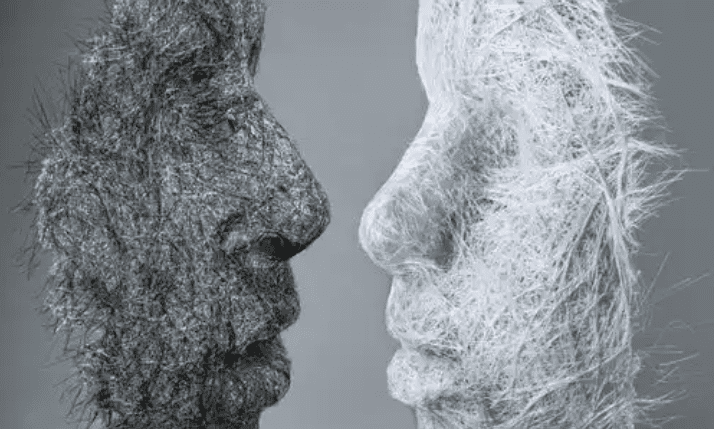Psychodrama is a form of psychotherapy created by Jacob Levy Moreno, consisting of re-enacted scenes
Psychodrama is about reliving scenarios and being “here and now”. This is one of the best-known maxims of humanistic psychology, which aims to facilitate self-realization by developing the potential of human beings. They can only achieve this when they let go of the past and overcome the anxious thinking that the future is only a possibility.
As you can see, psychodrama is one of the basic models of the humanistic orientation, which uses “dramatic” action as a way of being and then uses the body, word and action to recreate scenarios. Role-playing or family sculpting techniques and even Gestalt psychotherapy are based on it.
Living in the present but existing in a temporal continuum
Although people constantly project themselves into the future by remembering their past selves, they can only really know themselves in the present moment. The past is a reconstruction, a fairy tale you tell yourself to satisfy your ego. The future is also an expression of fears and desires.
Often, staying in the moment is complicated because you have learned to develop a vision of your identity based on your own and others’ expectations (who you think you should be, or who others want you to be – according to you).
The present is a state of consciousness, not a time like this, hence the art of reliving scenarios.
As a dynamic and changing being, man cannot live in the immediacy of his experiences. In fact, they have to constantly elaborate and integrate their history and anticipate their future. So it is very difficult to stay in the moment. Moreover, even defining the present is a fundamentally impossible task.
Staying in the present means stopping the flow of experience, focusing on a particular experience and the sensations, emotions, feelings and thoughts that arise from it. To do this as an external observer who does not judge or evaluate but accepts the experience as it is. This is exactly what psychodramatization is about.

Human beings are born actors
People think in scenarios. In fact, there are two basic axes, two coordinates that define every scenario of your life. This is each memory: time and space. “We think of time as something linear, predictable, but it’s something that shapes our experiences and the situation in which we find ourselves as organisms,” says Kia Nobre, a neuroscientist at the University of Oxford.
You see, your situation changes the perception of time and space, and the way you form your memories changes your perception of reality. Thus, “Memories constantly change the way we perceive the world”. So you remember scenarios and integrate them according to the scenario of your own life.
Psychodrama captures the process through which you construct your identity (past and future) and which unfolds in the here and now. Thus it is possible to shape and change what hinders your personal and social development.
Now is the time to change
You can neither change the past nor the future, because any change happens in the present. Moreover, the effectiveness of psychodrama lies in reproducing the natural process by which you perceive, process and interpret reality. This happens in a simple and accessible way for any person, regardless of age, situation or cultural background.
Psychodrama places one’s mental script into a physical script. In other words, in a space where everything is appropriate and possible. You can dramatize scenes from the past, fears, future fantasies, dreams, aspirations… In the end everything happens in this scenario. Here and now, where you make all the changes you really need/want to make.
Theater of emotions and re-living scripts
Emotional management is important for proper human development. Even neurologist Antonio Damasio has said that “The brain is a theater of emotions and feels the motivation of the mind”.
- The recall of memories follows an emotional pattern. Therefore, emotional tone and intensity often lead to linking certain scenarios, situations and people. From here you can create emotionally marked cognitive maps.
- Also, when you remember, you bring to mind maps, clusters (sets of information) that help you make decisions. These often hide attitudes that you may not be aware of. It is as if you are in the forest but you cannot see the trees.
When you dramatize and play a role in a particular scene, you activate the multiple intelligences that Gardner talks about, including kinesthetic bodily intelligence. Therefore, you can have a broader awareness where you can observe yourself without prejudice and you can act freely.
Re-living scenarios – you come from your ties
Try to remember an important scenario in your life. Someone you were when you were on your own. Maybe you were a teenager locked in your room. Maybe it was a few years ago and you had to make an important decision at home. It doesn’t really matter what it is as long as it is relevant to you. Then connect with the emotion in that image and the emotion that made you remember it at that very moment.
Allow yourself to immerse yourself in the feeling of the present moment. Then observe the memories that form in your mind. Probably important people in your life will be in them. It is actually quite difficult, even impossible, not to think about them.
This is because you are the fruit of your bonds. From them you develop an attachment style that, according to research, persists over time and influences the way you love. They also influence the dynamics and choice of partner, along with psychopathology, self-esteem and many other factors essential to your identity in youth.
It will be easier to communicate and adapt to the environment in a positive way. Almost to the extent that you can see others as they are. To be able to see yourself as you are here and now. Also, being able to meet others without delusions, prejudices or projections is important for a true rapport. This is a therapeutic factor in psychodrama.
Conclusion about reliving scenarios
Psychodrama is a way to explore scripts from the past. It is about re-creating and reliving. It works dynamically, intuitively and interactively by activating different kinds of memories and intelligence. It helps you in an effective and direct way. Both to become aware of your situation and to resolve possible conflicts and problems that block your development and hinder your well-being. As you can see, it does this by reconnecting and re-actualizing your being in the world here and now.

